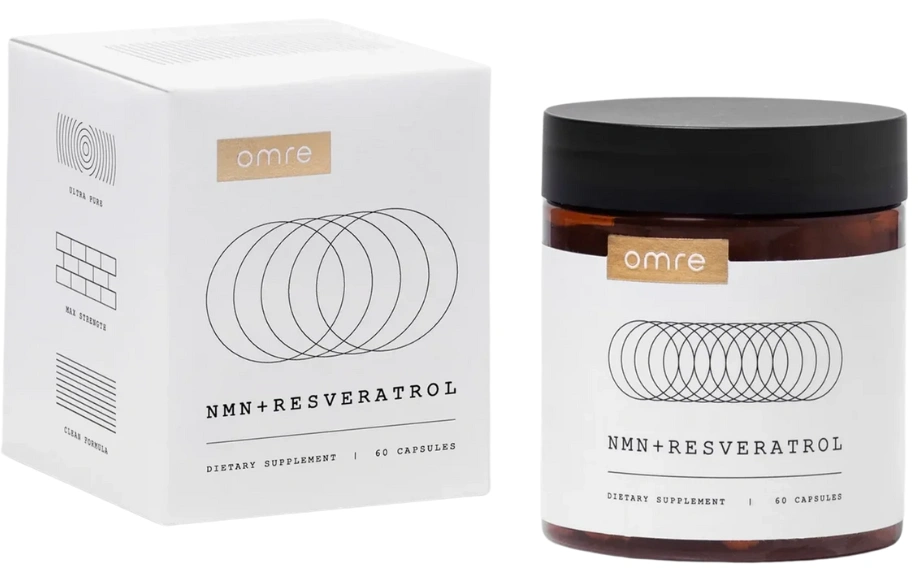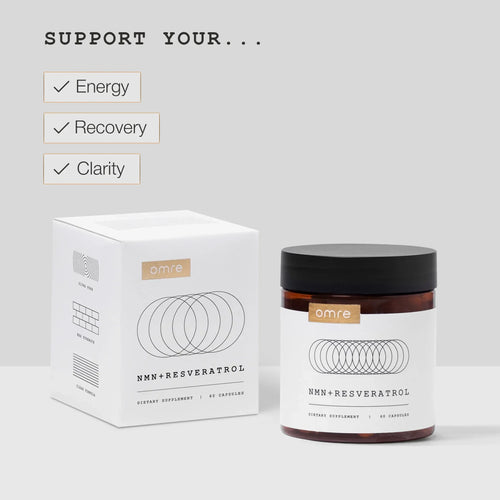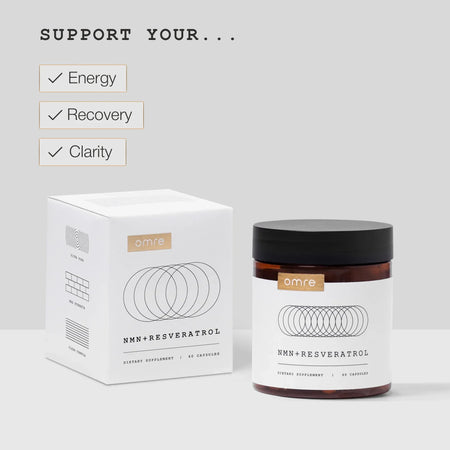Table of Contents
- Key Takeaways
- What Are the Differences Between NMN and NMNH?
- What Is NMN (Nicotinamide Mononucleotide)?
- What Is NMNH (Nicotinamide Mononucleotide Hydrogen)?
- What Are the Potential Benefits of NMN and NMNH Supplementation?
- NMN vs NMNH: Safety and Side Effects
- NMN vs NMNH: Which One Is Better?
- How to Choose the Right One for You
- Conclusion
- FAQs
NMN and NMNH are both NAD+ precursors that may support energy and healthy aging. NMN is more researched and widely used, while NMNH is newer and less studied.
Understanding how they differ can help you decide which one aligns better with your health goals and comfort level with emerging science.
NMN + RESVERATROL
Cellular NAD+ booster with ultra‑pure NMN and Resveratrol, at research‑backed doses.*
Key Takeaways:
NMN is well-studied in both animals and humans, with a strong safety record.
NMNH may raise NAD+ faster, but research is still limited and early-stage.
Both support cellular energy and healthy aging, but NMN is more widely used and accessible.
NMNH is harder to find and not yet tested in human trials, so long-term effects remain uncertain.
What Are the Differences Between NMN and NMNH?
 NMN and NMNH are both NAD+ precursors that may support energy and cellular repair. The key difference is that NMN is well-researched and widely available, while NMNH is newer, less studied, and may raise NAD+ levels faster but lacks human trials.
NMN and NMNH are both NAD+ precursors that may support energy and cellular repair. The key difference is that NMN is well-researched and widely available, while NMNH is newer, less studied, and may raise NAD+ levels faster but lacks human trials.
While both compounds aim to support healthy aging by raising NAD+ levels, they aren’t created equal. Here’s a quick comparison to help you see how they stack up:
Now, let’s take a closer look at the main differences:
Research and Evidence
NMN has been the focus of numerous human and animal studies, establishing its safety and potential benefits. For instance, a study published in Cell Metabolism demonstrated that NMN improved energy metabolism and insulin sensitivity in aging mice (1).
In contrast, NMNH is still in the early stages of research, with most studies limited to lab settings or animal models. This lack of extensive evidence makes NMN the more reliable choice for now.
Chemical Structure and Function
NMNH is a reduced form of NMN, meaning it has an extra hydrogen molecule. This small difference changes how the body processes it.
According to some studies, NMNH might be absorbed faster, potentially raising NAD+ levels more efficiently (2). However, these claims are based on preliminary research, and NMN’s established pathways remain the gold standard.
Availability and Safety
NMN is widely available as a dietary supplement and has been tested in human trials for its safety. A study confirmed that NMN supplementation was well-tolerated with no major side effects (3).
On the flip side, NMNH isn’t as accessible and lacks the robust safety data that NMN has accumulated. Until further studies validate NMNH’s safety, it’s better to tread carefully.
What Is NMN (Nicotinamide Mononucleotide)?
NMN, or nicotinamide mononucleotide, is a naturally occurring molecule that plays a critical role in boosting NAD+ levels in the body. NAD+ is vital for energy production, cellular repair, and healthy aging, making NMN a popular supplement for those looking to maintain their vitality.
NMN is a derivative of vitamin B3, found in small amounts in foods like broccoli, avocados, and milk. Once inside the body, NMN is converted into NAD+, which fuels countless cellular processes, including metabolism and DNA repair.
Research suggests that NMN supplementation may help counter the age-related decline in NAD+, keeping cells healthier for longer.
People often turn to NMN supplements for potential benefits like improved energy levels, better heart health, and enhanced brain function.
While research is ongoing, NMN is widely recognized for its promising role in supporting long-term wellness.
What Is NMNH (Nicotinamide Mononucleotide Hydrogen)?
NMNH, or nicotinamide mononucleotide hydrogen, is the reduced form of NMN, known for its ability to raise NAD+ levels even more rapidly. This compound is still under research, but early studies hint at a stronger and faster impact on cellular health compared to NMN.
Unlike NMN, NMNH is loaded with an extra hydrogen molecule, making it chemically distinct.
This difference may enhance its stability and effectiveness in the body, although it’s not yet as thoroughly studied or widely available as NMN.
While NMNH shows promise for improving metabolic health, protecting cells, and potentially offering a faster path to rejuvenation, its safety and regulatory status are still in the gray zone.
If you’re curious about NMNH, consult a healthcare professional before diving in.
What Are the Potential Benefits of NMN and NMNH Supplementation?
-v1753747393472.webp) Both NMN and NMNH are drawing attention for their possible role in supporting healthy aging and improving how our cells function. While they share some similarities, each has unique traits worth considering. Let’s explore their potential benefits with a balanced view.
Both NMN and NMNH are drawing attention for their possible role in supporting healthy aging and improving how our cells function. While they share some similarities, each has unique traits worth considering. Let’s explore their potential benefits with a balanced view.
Improved Energy Levels and Metabolism
One of the potential perks of NMN is its ability to support NAD+ production, which plays a role in how our bodies create and use energy.
Research on older animals has shown improvements in energy metabolism and activity levels with NMN supplementation (4).
As for NMNH, it’s still early days, but its structure might allow for quicker effects in boosting NAD+ levels.
Preliminary lab studies suggest it could have an edge in delivering energy-related benefits, though human research is still needed to confirm this (5).
Heart and Vascular Health Support
Heart health is another area where NMN has shown promise. Animal studies suggest it may help improve blood flow and flexibility in aging arteries, which could support cardiovascular wellness (6).
NMNH might offer similar benefits, but the research hasn’t yet caught up. For now, NMN remains the more studied option in this area.
NMN + RESVERATROL
Cellular NAD+ booster with ultra‑pure NMN and Resveratrol, at research‑backed doses.*
Enhanced Brain Function and Cognitive Support
Aging often comes with challenges in maintaining mental sharpness. Animal studies have linked NMN supplementation to potential improvements in brain function and slower cognitive decline with age (7).
NMNH’s faster impact on NAD+ could theoretically help here, too.
However, without human trials to back it up, any claims about its effect on brain health remain speculative.
Cellular Repair and Anti-Aging Potential
Both NMN and NMNH may support cellular repair by replenishing NAD+, which is tied to repairing DNA damage over time.
Research in animals suggests that NMN could help address damage caused by aging or environmental factors (8).
NMNH, given its structural differences, might have similar effects, but studies to confirm this in humans are still pending.
Metabolic Health and Weight Management
Animal studies have also shown that NMN may play a role in improving insulin sensitivity and managing fat accumulation, which could be helpful for metabolic health (9).
NMNH could share these benefits, though current research hasn’t fully explored this area. For now, NMN holds a stronger track record in supporting metabolic wellness.
NMN vs NMNH: Safety and Side Effects
Both NMN and NMNH are generally considered well-tolerated, with few reported side effects. NMN, in particular, has undergone multiple human studies, which found it safe for daily supplementation at doses up to 500 mg over 12 weeks (10).
Most people experienced no adverse effects, although mild symptoms like nausea or headaches have been reported in rare cases.
NMNH is less researched, so its safety profile isn’t as established. Early preclinical studies suggest it might share a similar tolerance level to NMN, but human trials are still lacking.
Until more is known, NMNH should be approached cautiously, especially for long-term use or high doses.
NMN vs NMNH: Which One Is Better?
NMN is currently the better option for NAD+ supplementation because it is more researched and has an established safety profile. While NMNH shows promise for potentially faster effects, it lacks the extensive studies needed to confirm its efficacy and safety.
NMN remains the gold standard for NAD+ precursors. Numerous studies back its benefits for energy, metabolism, and aging, making it a trusted choice.
In contrast, NMNH is still in its infancy in terms of research, making it harder to recommend confidently.
That said, NMNH could represent the next evolution in supplementation, offering potentially faster NAD+ restoration.
However, until more human trials are completed, NMN's proven track record will make it the safer and more reliable pick for anyone looking to support their health.
How to Choose the Right One for You
Deciding between NMN and NMNH can feel like navigating a crossroads, but a few key points can help make the choice simpler. The right supplement often depends on your personal health goals, comfort with available research, and the type of results you’re hoping to achieve.
Research and Evidence: NMN has been extensively studied in both animals and humans, giving it a strong safety profile. NMNH, while promising, is still in early stages with limited research available.
Purity and Quality: Look for supplements made by reputable manufacturers that use high-purity ingredients and offer third-party testing to confirm quality and avoid fillers.
Dosage: NMN typically comes in research-supported doses of around 500 mg per serving, while NMNH lacks clear dosage guidelines due to limited studies.
Added Ingredients: Some supplements include ingredients like Resveratrol or BioPerine® to improve absorption and enhance effectiveness.
Your Personal Goals: NMN is a great choice for those prioritizing reliability and well-documented benefits, while NMNH might interest those open to exploring newer options with emerging research.
 For those seeking a high-quality option, OMRE NMN + Resveratrol is a standout. It combines ultra-pure NMN with Resveratrol to support healthy aging and cellular energy, while BioPerine® enhances its absorption.
For those seeking a high-quality option, OMRE NMN + Resveratrol is a standout. It combines ultra-pure NMN with Resveratrol to support healthy aging and cellular energy, while BioPerine® enhances its absorption.
Manufactured in FDA-registered facilities and third-party tested, this supplement prioritizes quality and transparency, making it a trusted choice for those serious about their health.
Conclusion
NMN and NMNH have brought exciting possibilities for supporting cellular health and vitality. Both work to replenish NAD+ levels, but NMN stands out as the more reliable choice.
With years of research and a strong safety record, it’s the smarter option for those focused on energy, metabolism, and healthy aging. NMNH, while promising, still needs more time and study before it can match NMN's credibility.
If you're leaning toward NMN but still want a supplement that goes beyond the basics, OMRE NMN + Resveratrol is a smart next step.
It combines ultra-pure NMN with Resveratrol to support healthy aging, brain function, and daily energy, and it's backed by third-party testing for peace of mind.
Feel the difference of clean, research-backed ingredients working together for your long-term wellness.
Explore OMRE NMN + Resveratrol now and give your cells what they need to thrive.
FAQs
Is NMNH better than NMN for boosting NAD+?
NMNH may raise NAD+ levels faster due to its reduced form, but NMN is more thoroughly researched and considered safer for long-term use.
Can I take NMN and NMNH together?
There’s no research yet on taking NMN and NMNH together. It’s best to stick with NMN unless advised otherwise by a healthcare provider.
How long does it take for NMN or NMNH to work?
Some users report feeling benefits from NMN within a few weeks. NMNH may act faster in theory, but without human trials, timing and effectiveness remain speculative.
Are there any side effects of NMN or NMNH?
NMN has been shown to be well-tolerated in clinical studies, with mild side effects like nausea or headaches in rare cases. NMNH has not been tested in humans, so its side effect profile is unknown.





